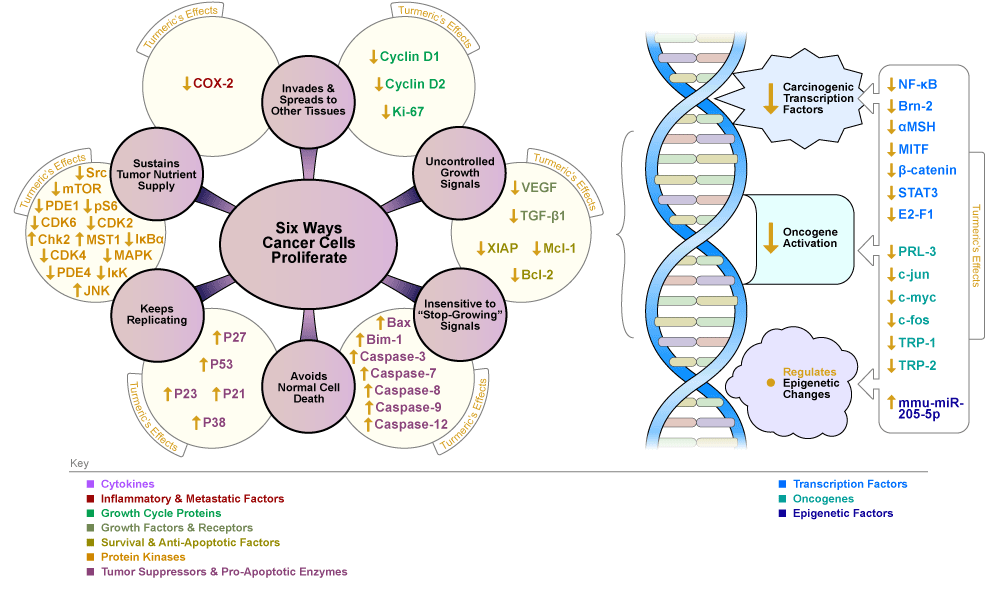Turmeric May Help Reduce the Risk of Skin Cancer

Skin Cancer and Wrinkles
Did you know that many of the factors that increase the risk of skin cancer are also linked to aging skin? Toxins, cigarette smoking, and especially UV radiation all cause skin damage that leads to wrinkles and uneven skin tone. The good news is that turmeric compounds could help keep your skin looking its best and healthy too! (vi.483-485)
With skin cancer rates on the rise, experts suggest that natural compounds can help protecting your skin inside and out. Studies show that using turmeric and its compounds (both nutritionally and topically) may be able to prevent or even treat skin cancer. In fact, cooking turmeric with coconut or olive oil transforms its curcumin compounds into even more powerful anticancer fighters. (vi.443-447)
Causes and Risk Factors for Skin Cancer
Skin cancer causes and risk factors include:
- Ultraviolet radiation (UVA, UVB, and UVC) from sun exposure. (vi.443, 444)
- Family history. (vi.443)
- Aging. (vi.443)
- Tanning booths. (vi.443)
- Radiation from many x-rays. (vi.443)
- Fair skin. (vi.443)
- Sunburns. (vi.443)
- Toxins (e.g., environmental, nutritional, cigars, and cigarettes). (vi.220, 443)
- Immune system suppression. (vi.443)
- Human papilloma virus (HPV). (vi.443)
All of these factors increase the likelihood of DNA damage in skin cells that can lead to cancer. (vi.443)
How Can Turmeric Help Fight Skin Cancer?
Turmeric's curcumin compounds were tested in one small clinical study involving patients with precancerous lesions with a high risk of progressing to full-blown cancer. In the 6 patients with Bowen's disease of the skin, none progressed to malignancy during the 3 month study. Two of the patients actually showed improvement at the cellular level. (vi.8)
The antioxidant and anti-inflammatory properties of turmeric and many of its compounds help protect against free radicals, inflammation, and DNA damage that can cause or promote skin cancer. Combinations of compounds (as they are in turmeric and other foods) may also have a cumulative effect against cancer cells. In fact, studies suggest they may even work better together in suppressing cancer cell growth. (vi.153, 443-448)
| Turmeric Compound | Effects in Preclinical Studies |
|---|---|
|
1,8-cineole (vi.71, 72) (also known as eucalyptol) |
What effects does 1,8-cineole have against skin cancer? Answer: |
|
What effects does alpha-linolenic acid have against skin cancer? Answer: Alpha-linolenic acid protects skin against UV radiation damage. (vi.449) |
|
|
Alpha-pinene (vi.71, 72) |
What effects does alpha-pinene have against skin cancer? Answer:
|
|
What effects does alpha-terpineol have against skin cancer? Answer: |
|
|
What effects does ar-turmerone have against skin cancer? Answer:
|
|
|
Beta elemene (vi.415) |
What effects does beta elemene have against skin cancer? Answer:
|
|
What effects does borneol have against skin cancer? Answer: When combined with curcumin, borneol increases curcumin's effectiveness in the following: (vi.448)
|
|
|
What effects does caffeic acid have against skin cancer? Answer:
|
|
|
What effects does camphor have against skin cancer? Answer:Camphor blocks DNA damage from UVC radiation. (vi.154) |
|
|
Curcumin (vi.74) |
What effects does curcumin have against skin cancer? Answer: Both topical and oral doses of curcumin have been tested in lab and animal studies against skin cancer, especially melanoma. They suggest that curcumin can help prevent and treat skin cancer. Curcumin also works well with different chemotherapy drugs. Interestingly, in lab studies low doses of curcumin combined with exposure to visible light and UVA radiation significantly blocks melanoma growth. (vi.452) Curcumin blocks expression of growth cycle proteins such as Ki-67 and cyclin D1, including in melanoma and squamous cell carcinoma. Research indicates that substances that suppress Ki-67 can stop cancer cells from growing and is a strong indicator of survival in melanoma. In an animal model of this aggressive type of skin cancer, curcumin suppressed levels of Ki-67 by itself, although the effect was much greater when animals were exposed to UVA radiation. This may be especially important in thick, nodular melanomas, since recent analysis of cancer patient cases confirms that high Ki-67 levels themselves are associated with a poorer prognosis in this type of melanoma — more so than even mitotic count. (vi.107-108, 122, 275, 453-454) In another animal study, curcumin significantly inhibited growth of squamous cell carcinoma skin tumors. The strength of its antitumor effect was dose-dependent. Other animal studies show that oral curcumin doses significantly reduce the size of chemoresistant and highly metastatic melanoma tumors. (vi.122, 275, 455) Multiple lab and animal studies also show the following anti-skin cancer effects of curcumin (both dose and time-dependent):
Note: Lab studies show M14 melanoma cells are resistant to curcumin treatment due to overexpression of a gene involved in lipid removal from cells. (vi.475) |
|
What effects does eugenol have against skin cancer? Answer:
|
|
|
What effects do farenesene and farnesol have against skin cancer? Answer: Farnesene and farnesol show the following anticancer effects: |
|
|
What effects does ferulic acid have against skin cancer? Answer:
|
|
|
What effects does fisetin have against skin cancer? Answer:
|
|
|
What effects does geraniol have against skin cancer? Answer: |
|
|
What effects does limonene have against skin cancer? Answer:
|
|
|
What effects does quercetin have against skin cancer? Answer:
|
|
|
What effects does resveratrol have against skin cancer? Answer:
|
|
|
Rho-cymene (vi.71, 72) |
What effects does rho-cymene have against skin cancer? Answer: |
|
Vanillic acid (vi.55, 74) |
What effects does vanillic acid have against skin cancer? Answer:
|
|
What effects does vitamin C have against skin cancer? Answer:
|
|
|
What effects does vitamin E have against skin cancer? Answer: Vitamin E is recommended for nutritional protection. (vi.443) |
|
|
Whole turmeric extract |
What effects does whole turmeric extract have against skin cancer? Answer:
|
|
What effects does xanthorrhizol have against skin cancer? Answer:
|

How Turmeric Compounds Stop Skin Cancer Cells (vi.16, 56, 75, 80, 81, 84, 108, 122, 275, 415, 450, 454, 456-474, 476)
Caution: Curcumin and Cytokine Therapy
Lab studies suggest that curcumin could inhibit the effectiveness of cytokine therapy for melanoma. (vi.472)
Join the 1000s of People Who Are Discovering the Benefits of Turmeric.

Healthceuticals® Turmeric Curcumin Complex
100% Certified
Organic ingredients
- Organic Turmeric Extract - standardized to 95% curcuminoids.
- Organic Whole Turmeric - provides full spectrum antioxidant, anti-inflammatory turmeric benefits, including turmerones and numerous vitamins, minerals, and phytonutrients
- Organic Black Pepper Extract - standardized to 95% piperine; dramatically enhances bioavailablity.
- Organic Phospholipids - markedly improve absorption.
- Organic Ginger - works synergistically with turmeric to provide more powerful benefits.
- Absolutely FREE of potentially harmful additives and fillers such as magnesium stearate.


